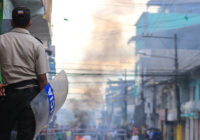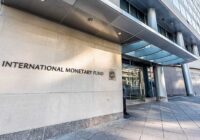Ushered into the presidency by the soft populism of Rafael Correa, Lenin Moreno’s administration began its term with high levels of popularity.
It has been more than a year since Lenin Moreno was elected president of Ecuador for a four-year term. Moreno, who is 65, ran as a candidate of one the country’s most influential political parties, Alianza País, which he has presided over since May 2017. It is the party of the former president, Rafael Correa, who also happens to be one of Alianza’s co-founders.
President Correa was in office from 2007 to 2017, and Moreno served as his vice president for nearly half of that decade. Moreno, who lost mobility in both of his legs during an armed robbery in 1998, has previously served as special envoy of the secretary general of the United Nations for disability and accessibility. However, despite of assuming the presidency as the status-quo candidate bound to continue on from Correa’s tenure, Moreno has abruptly parted ways with his predecessor.
The 2017 presidential election was extremely polarizing, particularly the runoff campaign that finally saw Moreno beat businessman Guillermo Lasso in the second round. On his accession to the presidency, Moreno inherited a country with high levels of public spending, recovering from a significant economic slowdown marked by sluggish and even negative economic growth during 2015 and 2016. These dynamics were mainly due to the fact that, during President Correa’s administration, as international petroleum prices collapsed, the overall foreign investment in Ecuador substantially decreased.
Meanwhile, on the political front, Jorge Glas, who served as Ecuador’s vice president between 2013 and January 2018 under both Correa and Moreno, has been sentenced to six years in jail for his implication in the Odebrecht bribery scandal that has rocked Latin America in recent years. This January, Maria Alejandra Acuña, from Alianza País, became Ecuador’s current vice president.
Shortly after leaving office Correa settled in Belgium, where his wife is from and where he completed his master’s studies. From Europe, Correa has become a vocal critic of his handpicked successor on numerous policy matters. Meanwhile, back in Ecuador, the state prosecutor’s office has opened up several investigations against Correa, the most significant accusing him of having orchestrated the kidnapping and intimidation of a political opponent exiled in Colombia back in 2012.
Moreno’s Turn
These political and economic tensions have taken a toll on Ecuador’s political scene and divided Alianza between supporters of the current president and those of his predecessor. During his first year in office, Moreno broke ranks with his political mentor in several respects.
As president, Rafael Correa was one of the faces of the so-called “pink tide” of leftist leaders who governed almost all of Latin America during the 2000s. Alongside Venezuela’s Hugo Chavez, Nicaragua’s Daniel Ortega, Bolivia’s Evo Morales and Brazil’s Lula da Silva, Correa preached a distinct social and economic development model for Latin America while at times antagonizing the financial and political institutions of the Washington Consensus. For instance, it was Correa who opened up Ecuador’s London embassy as a political asylum for Julian Assange, and it is only because Alianza País is still in power that Assange has not been asked to leave his refuge.
However, President Moreno’s attitude toward Assange’s presence in the embassy has been less tolerant and accommodating. Recently, Moreno stated that his government is in discussions with the UK and other international stakeholders to turn Assange in if there is full assurance that the death penalty will not be sought for the Australian whistleblower.
Most importantly, while President Correa was an ally and member of Latin America’s emblematic left-wing governments, President Moreno has spared no time in condemning the authoritarianism and systematic violation of human rights by the governments of Nicaragua and Venezuela. Moreover, Moreno seems to have veered toward the center right in his political affinities, turning his back on some of Alianza’s left-wing base.
In this regard, the current president has prioritized strengthening Ecuador’s relationships with the hemisphere’s right-wing governments — most notably he recently visited neighbouring Peru, attended the inaugural of Colombia’s President Ivan Duque in August and welcomed US Vice President Mike Pence to Quito in June.
Another key issue that has marked Moreno’s first year as president has been Ecuador’s relationship with Colombia, particularly as it relates to transnational crime along their shared border. Earlier this year, three Ecuadorian journalists were kidnapped and killed by dissident guerrilla groups still active along Colombia’s border with Ecuador. During this weeks-long crisis, the administration of former Colombian President Juan Manuel Santos was slow and inefficient in its reaction, which caused great public outrage in Ecuador. Around this time, Moreno decided that Ecuador would no longer be the host country for the stalled negotiations between the Colombian government and the National Liberation Army (ELN) guerrillas, due to the group’s continued criminal activity along the border. These fragile and ongoing negotiations were moved to Cuba in May of this year.
Paving a Path Forward
Most importantly, the current government’s break with Correa became most evident when Moreno summoned Ecuadorians to a seven-question referendum earlier this year to amend the country’s constitution. During the vote, the administration received overwhelming support on all of its proposals, which has begun a substantial transformation of key state institutions. From limiting re-election terms and barring those convicted of corruption from public office to eliminating fuel subsidies and undertaking major infrastructure projects, President Moreno’s packed agenda seems directed at marking a post-Correa political era.
Moreover, Moreno intends to undertake several reforms inside the government in order to increase efficiency and reduce expenditure. Some of these reforms include reducing the current amount of ministries, revising the taxation of items such as household appliances and eliminating some of the key subsidies established by the previous government — most significantly eliminating state subsidies on gasoline and natural gas prices. The elimination of these subsidies would affect Ecuador’s working and urban classes in particular, given that it would increase the price of basic food staples, public transport and basic utilities.
Ushered into the presidency by the soft populism of Rafael Correa, Lenin Moreno’s administration began its term with high levels of popularity. However, throughout the last year, Moreno’s approval ratings have fallen from around 77% in August 2017 to 46% this past June. The rupture within the Alianza País party between Correa and Moreno loyalists, the constant attacks from his predecessor, the ongoing governmental reforms and a recent corruption scandal involving the national petroleum company, Petroecuador, have all taken a toll on President Moreno’s political capital. It is very likely that Moreno will be a one-term president and that his aggressive reform agenda, though positive, will remain highly controversial for years to come.
The views expressed in this article are the author’s own and do not necessarily reflect Fair Observer’s editorial policy.
Support Fair Observer
We rely on your support for our independence, diversity and quality.
For more than 10 years, Fair Observer has been free, fair and independent. No billionaire owns us, no advertisers control us. We are a reader-supported nonprofit. Unlike many other publications, we keep our content free for readers regardless of where they live or whether they can afford to pay. We have no paywalls and no ads.
In the post-truth era of fake news, echo chambers and filter bubbles, we publish a plurality of perspectives from around the world. Anyone can publish with us, but everyone goes through a rigorous editorial process. So, you get fact-checked, well-reasoned content instead of noise.
We publish 2,500+ voices from 90+ countries. We also conduct education and training programs
on subjects ranging from digital media and journalism to writing and critical thinking. This
doesn’t come cheap. Servers, editors, trainers and web developers cost
money.
Please consider supporting us on a regular basis as a recurring donor or a
sustaining member.
Will you support FO’s journalism?
We rely on your support for our independence, diversity and quality.






